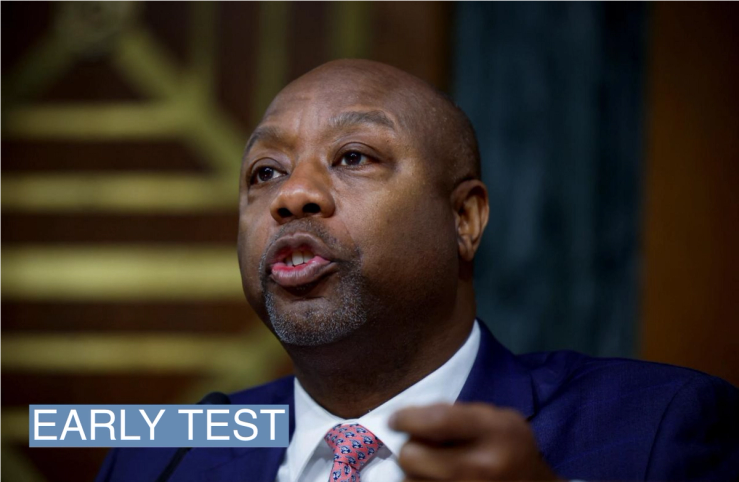The Scene
MANCHESTER, NH — Inside the Red Arrow Diner — a compact, no-frills, 24-hour restaurant that’s become a staple along the campaign trail — South Carolina Sen. Tim Scott charmed the crowd, probing locals on the state’s “hot topics,” posing for photos with kitchen staff, and eating a hearty breakfast (he had an omelette with a side of grits and toast).
“He’s very, very good at retail politics,” Christopher Ager, chairman of the New Hampshire Republican Party, told Semafor. “He’s very comfortable with it, and I think that’s a good indicator for how he might be received in the state.”
Everything seemed to be going great — except for one very specific topic.
In this article:
Shelby’s view
Scott, who announced he is exploring a run for president this week, repeatedly struggled to handle questions about his position on abortion.
He didn’t directly answer when pressed on whether he believes “medication abortion” should remain legal. A gifted orator in most circumstances, Scott seemed less comfortable when asked point-blank whether he would “support a federal ban on abortions.”
“I’m 100% pro-life. I’d never walk away from that, but the truth of the matter is, when you look at the issues on abortion, I start with the very important conversation I had in a banking hearing, when I was sitting in my office and listening to Janet Yellen, the Secretary of the Treasury, talk about increasing the labor force participation rate for African American women who are in poverty by having abortions,” Scott said, going on to argue that the country is “having the wrong conversation” and continuing to discuss the banking hearing.
Scott declined to say whether he supported Sen. Lindsey Graham’s, R-S.C. bill to ban abortion nationally after 15 weeks in a CBS News interview on Wednesday, though he repeatedly said he was “100% pro-life.” The next day he told New Hampshire-based WMUR that he would “definitely” sign a 20-week abortion ban as president and that the country should “have a federal limit on how far we can go.” He brought the subject back around to the left’s “extreme positions” when asked Thursday morning about a bill he co-sponsored that would jail doctors who performed abortions past 20 weeks, and then told Fox News that evening that he’d also consider a 15-week abortion ban.
His winding, at times half-answers underscore the reality for both the South Carolina lawmaker and Republican 2024 hopefuls writ large: The topic remains a sticky subject for the party.
Even within Scott’s home state he’s caught between competing Republican messages. Rep. Nancy Mace has criticized the party for going too far and too fast on abortion and called on the FDA to ignore a court decision blocking mifepristone. Graham has been pushing Republicans to sign onto his 15-week ban, which would also allow states to go further (South Carolina has a 6-week ban). And Scott’s 2024 rival, former governor Nikki Haley, has called for “consensus” on the issue without making her own position fully clear.
Ron DeSantis, who also resisted committing himself to a clear position for months, quietly signed a 6-week ban in Florida on Thursday. Former President Trump has complained Republicans did not include enough exceptions in state abortion bans ahead of the midterms, but is vague beyond that. Only Mike Pence has affirmatively rushed to leap on every new anti-abortion measure and publicize doing so. Just hours after Scott’s abortion comments on Thursday, Vivek Ramaswamy said that abortion should remain a state issue, full stop.
While that ambiguity might slide for now, eventually voters are going to be looking for solid, clear-cut policy positions on virtually all topics, especially one that members of both parties believe is playing a major role in recent elections.
“Candidates will have to recognize that we have a split view within the country and in the state. And so you can have your personal beliefs, but what will your public policy be?” Ager, the party chair, told Semafor.
That position could play differently in New Hampshire, where the GOP primary electorate tends to be more secular, independent, and supportive of abortion rights, than in early states like evangelical-heavy Iowa and South Carolina. At the same time, Ager said the relative lack of partisan conflict over New Hampshire’s abortion laws — a 24 week ban with exceptions he described as “very reasonable” — could make it a less front-of-mind issue.
Room for Disagreement
Some Republicans and anti-abortion groups believe Scott and other candidates will have an opportunity to turn the tables on Democrats for supporting late term abortions. “Joe Biden owns [abortion] all the way to pregnancy and that’s the least popular position of all,” GOP strategist Brad Todd said Thursday on Meet The Press NOW while discussing Scott’s and DeSantis’ positions.


